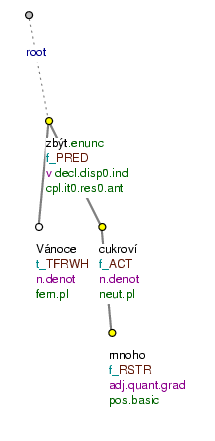- Definition of the
TFRWHfunctor -
The
TFRWHfunctor (temporal: from when) is a functor for a free modification with a temporal meaning corresponding to the question "from when?".
With TFRWH modifications, the temporal specification does not concern the event that is expressed by the governing word but rather the event that follows from the event expressed by the governing word, or a modification of the governing event. A modification with the TFRWH functor refers to the time (a moment or interval) in which the event or modification that follows from the event expressed by the governnig word is originally situated. Example:
Včera.TWHEN přeložil schůzi ze čtvrtka.TFRWH na dnešek.TOWH (=lit. Yesterday (he) postponed (the) meeting from Thursday to today.)
The situating in time is usually carried out by a direct specification of time (z pátku (=from Friday)), rarely also by specifying a temporal relation to another event (Odložila hubnutí z dovolené na pozdější dobu. (=lit. (She) postponed slimming from holiday till later.)).
Valency. Modification with the TFRWH functor is obligatory, just like TOWH modifications, when they follow certain verbs with the prefix pře- (e.g. přeložit (=to_postpone), přesunout (=to_delay)), or after the verbs pocházet (=to_come_from) and převzít (=to_take_over).
Forms. The basic forms of TFRWH modifications are:
-
prepositional phrase.
The most common forms:
od+2 cukroví od Vánoc (=lit. sweets from Christmas) z+2 vstupenka z pátku (=lit. ticket from Friday); Z dětství si nic nepamatuji. (=lit. From childhood (I) - nothing do_not_remember.) Example:
Od Vánoc.
TFRWHzbylo mnoho cukroví. (=lit. From Christmas were_left_over plenty (of) sweets.) Fig. 7.12 -
adverbial expressions (very rarely).
Example:
Zápisy jsou odvčera.
TFRWH(=lit. Registration has_been_running since yesterday.)
NB! This modification is usually not expressed by a dependent clause. However, a similar temporal modification modifying a noun can be expressed by a dependent clause (its effective root node is assigned the RSTR functor); e.g.:
Přeložil výuku z pátku.TFRWH, kdy se to nikomu nehodilo.RSTR, na vhodnější dobu. (=lit. (He) postponed (the) class from Friday when - it (to) anybody did_not suit to more_convenient time.)
Figure 7.12. The TFRWH functor

Od Vánoc zbylo mnoho cukroví. (=lit. From Christmas were_left_over plenty (of) sweets.)
Border with the TSIN functor. TFRWH modifications are only marginal. The TFRWH functor is both in its semantics and form close to a temporal modification with the meaning "from when?" (the TSIN functor; see Section 3.8, "TSIN"), for details see Section 3.8.1, "Borderline cases with the TSIN functor".
Border with the DIR1 functor. The meaning "from when?" can in certain cases (esp. with adverbial expressions) border on the locative meaning "where from?" (the DIR1 functor; see Section 4.1, "DIR1"). In such cases the choice of the functor depends on the decision of the annotator. Cf.:
-
zápisy ze schůze (=lit.notes from (the) meeting)
The modification ze schůze (=from the meeting) can be interpreted as having the meaning "from when?" (
TFRWH), or the meaning "where from?" (DIR1).
Border with other functors. The TFRWH functor can also border on other than temporal functors. However, in a particular context the choice of the functor is usually unambiguous. Cf.:
-
Strach ze středy Pavla ještě neopustil. (=lit. (The) fear from Wednesday Paul yet has_not_left.)
The modification ze středy (=from Wednesday) can express the day when the fear appeared for the first time (then it is assigned the
TFRWHfunctor), or in a different context (e.g. Paul is doing an important examination on Wednesady and he is afraid of it), the modification ze středy (=of Wednesday) can express the cause of the fear (CAUS).